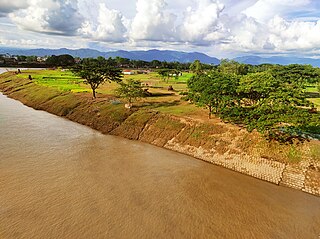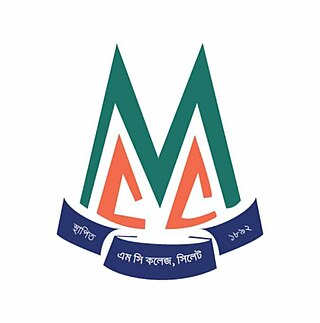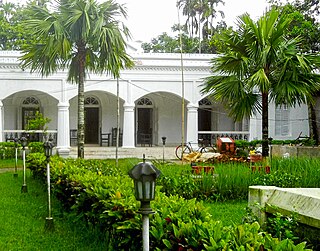
The music of Bangladesh spans a wide variety of styles. Bangladesh claims some of the most renowned singers, composers and producers in Asia. Music has served the purpose of documenting the lives of the people and was widely patronized by the rulers. It comprises a long tradition of religious and regular song-writing over a period of almost a millennium.

Kazi Nazrul Islam, popularly known as Nazrul, was a Bengali poet, writer, musician, and is the national poet of Bangladesh. Nazrul produced a large body of poetry, music, messages, novels, and stories with themes that included equality, justice, anti-imperialism, humanity, rebellion against oppression and religious devotion. Nazrul Islam's activism for political and social justice as well as writing a poem titled as "Bidrohī", meaning "the rebel" in Bengali, earned him the title of "Bidrohī Kôbi". His compositions form the avant-garde music genre of Nazrul Gīti.

Dewan Hason Raja Chowdhury, or simply known as Hason Raja, Bengali: হাসন রাজা; 21 December 1854 – 6 December 1922), was a Bengali mystic poet and songwriter from Sylhet, Bengal Presidency. His unique style of music made him one of the most prominent figures in Bengali folk culture.

Jasimuddin, popularly called Palli Kabi, was a Bangladeshi poet, lyricist, composer and writer widely celebrated for his modern ballad sagas in the pastoral mode. Although his full name is Jasim Uddin Mollah, he is known as Jasim Uddin. His Nakshi Kanthar Math and Sojan Badiar Ghat are considered among the best lyrical poems in the Bengali language. He is the key figure for the revivals of pastoral literature in Bengal during the 20th century. As a versatile writer, Jasimuddin wrote poems, ballads, songs, dramas, novel, stories, memoirs, travelogues, etc.

Kamalganj is an upazila of the Moulvibazar District in the Division of Sylhet, Bangladesh.

Kanaighat is an upazila of Sylhet Division of Bangladesh. It is the second-largest upazila (sub-district) of Sylhet District after Gowainghat Upazila. It is named after the town of Kanaighat, which is also the only municipality in the Upazila.

Murari Chand College was the first college in the Sylhet Division. It was established in 1892, making it the seventh oldest college in Bangladesh. Since then it has played an important role in the educational, cultural, and political spheres of Greater Sylhet.

Muhamed Mianudin Ahmed (Selim Al Deen) (18 August 1949 – 14 January 2008) was a Bangladeshi playwright and theatre artist. He was the founder chairperson of the Department of Drama and Dramatics at Jahangirnagar University. He was awarded Bangla Academy Literary Award in 1984 and Ekushey Padak in 2007 by the Government of Bangladesh for his contribution to theatre and won the Independence Award in 2023 for his contribution to the field of literature.
Dewan Mohammad Azraf was a Bengali philosopher, teacher, author, politician, journalist and activist. In 1993, he was honoured as a National Professor in Bangladesh. He was also a supporter of the Bengali Language Movement. For his support of the movement, he was dismissed from the post of the principal of Sunamganj College in 1954, the same year he was promoted to the post. His support was particularly influential when he edited the Nao Belal in 1948. He was actively involved with Kaikobad Sahitya Majlish (1972–99).

Abdul Latif Chowdhury, widely known as Saheb Qiblah Fultali, was a late-twentieth century Bangladeshi Islamic scholar, mufassir, qāriʾ, poet and orator. As a prolific author, he completed several works in Arabic, Bengali and Urdu including Muntakhab as-Siyār and Anwar as-Sālikīn. His books are part of syllabic studies under the Bangladesh Madrasah Education Board. Fultali was the leading figure of the Islamic Arabic University movement and the demand for fazil and kamil qualifications to be recognised as bachelor's and master's degrees. He is the founder of several influential organisations and institutions in Bangladesh and the United Kingdom such as Anjumane Al Islah, Hazrat Shahjalal Darussunnah Yaqubia Kamil Madrasa and Madrasah-e-Darul Qirat Majidiah.
The Sylheti or Sylhetis are an Indo-Aryan ethnocultural group that are associated with the Sylhet region. There are strong diasporic communities in Barak Valley of Assam, India, North Tripura, as well as in rest of Bangladesh and northeast India. They speak Sylheti, an Eastern Indo-Aryan language that is considered "a distinct language by many and a dialect of Bengali by some others".
Muhammad Mansuruddin was a Bengali author, literary critic, essayist, lexicographer and biographer from Bangladesh. He was an authority on folklore and was famous for a huge collection of age-old folk songs, mostly anthologised in thirteen volumes under the title Haramoni. In recognition of his lifelong contribution to folklore collection and research, the Rabindra Bharati University awarded him D.Litt. degree in 1987.
Syed Murtaza Ali was a Bangladeshi writer. He was the elder brother of writer and linguist Syed Mujtaba Ali. He is noted for his works relating to the histories of Chittagong, Sylhet and Jaintia.
Chowdhury is a title of honour, usually hereditary, originating from the Indian subcontinent. It is an adaption from Sanskrit. During the Mughal rule, it was a title awarded to eminent people, while during British rule, the term was associated with zamindars and social leaders. The common female equivalent was Chowdhurani. Many landlords under the Permanent Settlement carried this surname. Land reforms after the partition of India abolished the permanent settlement. In modern times, the term is a common South Asian surname for both males and females.

Munshi Muhammad Sadeq Ali, born as Sri Gaur Kishore Sen, was a prominent Dobhashi Bengali writer, poet and district judge from 19th century Bengal. He is considered to be the most well-known writer to have used the Sylheti Nagri script and this is due to his magnum opus, Halat-un-Nabi, which gained immense popularity in the Sylhet region and would later be transcribed in the Bengali script.
Munshi Muhammad Ashraf Hussain, was a Bengali poet, researcher and a collector of puthis and folk literature. He was also known for his contribution in the study of the Sylheti Nagri script.

The Maulvi family, better known as the family of Jitu Miah, were a wealthy Bengali Muslim jagirdar family of Maulvis based in Sylhet. They played important religious and political roles in the history of Sylhet, Bengal and the subcontinent. Jitu Miah, the last jagirdar of the family, died in 1925 without leaving behind an heir. However the family estate managed by the local government, continued to be a prominent landmark in the town and a legacy of the family.

Sylhet Gitika is the folklore of Sylhet region including the oral narrative poetry, stories, fables, etc. The source of Sylhet Gitika is considered to be the daily lifestyle of the ancient people of Sylhet region, the livelihood of the indigenous people, feudal system of governance, rural folklore, emotional feelings, love-separation, war and humanity. According to the list given by Professor Asaddor Ali, 120 folk tales have been included in the Sylhet Gitika. The lyric poems collected by Chandra Kumar De from East Mymensingh and Sylhet region with the efforts of Dr. Dinesh Chandra Sen were published gradually from Calcutta University as Purbanga Gitika and Maimansingha Gitika. Besides, Chowdhury Gulam Akbar selected 10 lyric poems from Bangla Academy in 1986 and published them together as Sylhet Gitika.

Shāh Muḥammad Ibrāhīm ʿAlī was a Bengali Islamic scholar, poet and activist of the Khilafat Movement. He wrote poetry in the Bengali, Urdu and Persian languages under the pen name of Tashna. His magnum opus Agnikuṇḍa is a compilation of his writings during his imprisonment.












